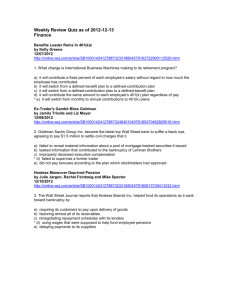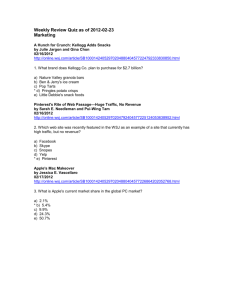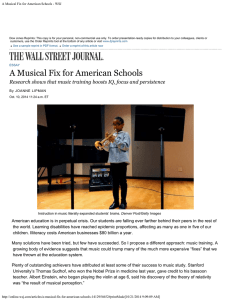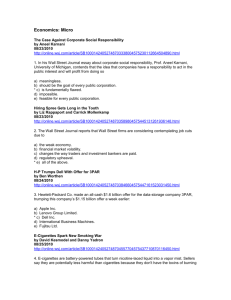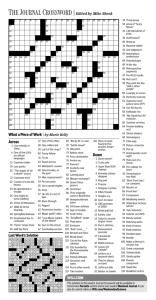Document 12852302
advertisement
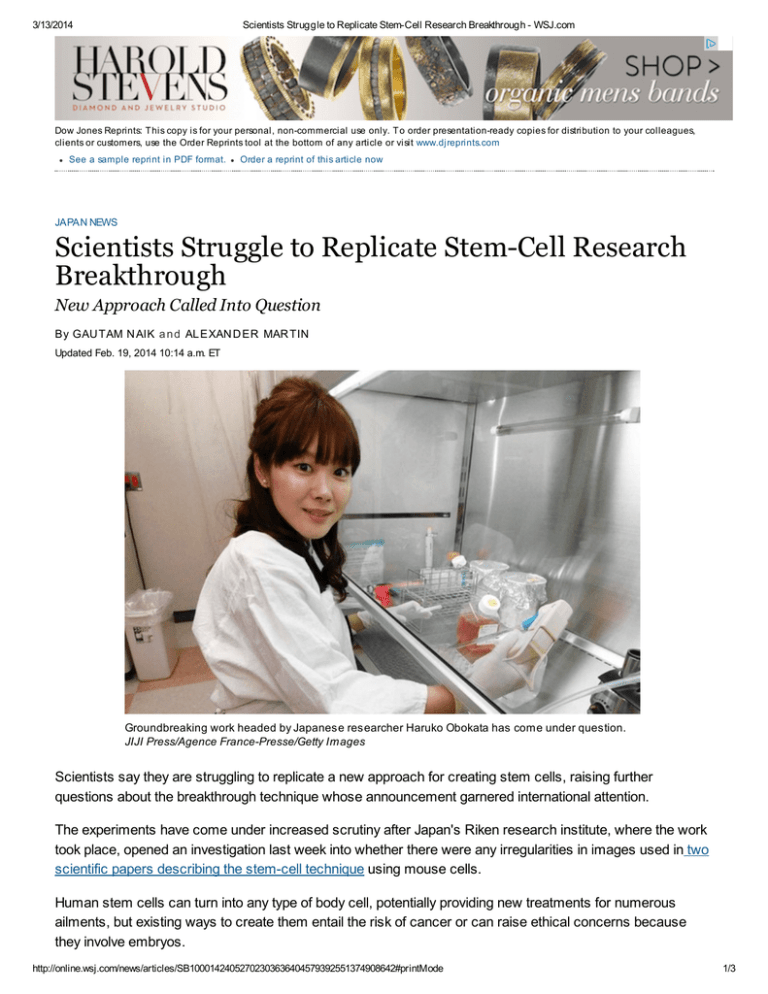
3/13/2014 Scientists Struggle to Replicate Stem-Cell Research Breakthrough - WSJ.com Dow Jones Reprints: This copy is for your personal, non-commercial use only. To order presentation-ready copies for distribution to your colleagues, clients or customers, use the Order Reprints tool at the bottom of any article or visit www.djreprints.com See a sample reprint in PDF format. Order a reprint of this article now JAPAN NEWS Scientists Struggle to Replicate Stem-Cell Research Breakthrough New Approach Called Into Question By GAU TAM N AIK a n d AL EXAN D ER MAR TIN Updated Feb. 19, 2014 10:14 a.m. ET Groundbreaking work headed by Japanese researcher Haruko Obokata has come under question. JIJI Press/Agence France-Presse/Getty Images Scientists say they are struggling to replicate a new approach for creating stem cells, raising further questions about the breakthrough technique whose announcement garnered international attention. The experiments have come under increased scrutiny after Japan's Riken research institute, where the work took place, opened an investigation last week into whether there were any irregularities in images used in two scientific papers describing the stem-cell technique using mouse cells. Human stem cells can turn into any type of body cell, potentially providing new treatments for numerous ailments, but existing ways to create them entail the risk of cancer or can raise ethical concerns because they involve embryos. http://online.wsj.com/news/articles/SB10001424052702303636404579392551374908642#printMode 1/3 3/13/2014 Scientists Struggle to Replicate Stem-Cell Research Breakthrough - WSJ.com Yoshiyuki Seki, of Kwansei Gakuin University's School of Science and Technology in Japan, thought it would be simple Stem-Cell Research Under Scrutiny to replicate the new method, but he couldn't get it to work with mouse cells. "It may be the case that it only works when various conditions are perfectly satisfied, or there may be some processes not mentioned in the article," he said. Related Jeanne Loring, director of the Center for Regenerative Medicine at the Scripps Research Institute in La Jolla, Calif., said her lab "tried it on human cells, and so far it hasn't worked." The original results appeared in January in two studies published in the high-profile journal Nature. They caused a stir because they described how mouse blood cells could be rapidly changed into an embryoniclike state simply by dipping them in a mild acid solution. The ease and speed of the technique promised to offer a far better route for making patient-specific tissue to potentially treat a range of diseases. Introducing WSJD, the Journal's new hom e for tech new s, analysis and product review s. FCC Tries Again to Stop Web Traffic Slowdowns Target CEO Struggles to Contain Giant Cybertheft How to Try Bitcoin Without Losing Your Shirt Paul Knoepfler, a stem-cell researcher at the University of California, Davis, runs a blog that is documenting efforts by various labs to replicate the findings. At least nine have said they couldn't do so, according to Dr. Knoepfler. In addition, about a half-dozen "top notch" labs had privately disclosed to him their failed efforts to reproduce the findings, he added. Four Tablets That Want to Replace Your Work Laptop Many of the labs' efforts may not have worked because they weren't following the exact protocols described in the Nature papers. Even so, "it looks like it's not such a simple technique at all," said Dr. Knoepfler. That could undermine the main appeal of the method—the apparent ease with which it is supposed to work. Teruhiko Wakayama of Yamanashi University in Japan was co-author of both Nature papers. He said he hasn't been able to reproduce the original results since he left Riken, the Japanese-government-funded institute where the lead author of the papers, Haruko Obokata, still works. http://online.wsj.com/news/articles/SB10001424052702303636404579392551374908642#printMode 2/3 3/13/2014 Scientists Struggle to Replicate Stem-Cell Research Breakthrough - WSJ.com Haruko Obokata, a scientist at the RIKEN Center for Developmental Biology in Japan, speaks in front of a screen showing Stimulus Triggered Acquisition of Pluripotency cells, in Kobe, Japan, in this photo taken by Kyodo on Jan. 28. Reuters Dr. Wakayama said he reproduced the results once when he was still at Riken but not since moving to Yamanashi. "There is know-how you need to learn to successfully reproduce the results, techniques which are hard to describe using words, but which you need to grasp through experience," he said. The controversy began when outside researchers noticed anomalies in several images in the Nature papers. In response, Riken launched its investigation, but said it believed the findings remain valid. Nature also said it is investigating. Riken has declined to make Dr. Obokata available for comment. Dr. Wakayama said that one image of a placenta was mistakenly inserted in the papers. He said it wasn't a case of image manipulation but a simple error. "If you read the article, it should be clear that the wrong picture is used," he said. He also said he was still confident in the results. Other researchers are less forgiving. "It indicates a level of sloppiness and makes me ask why we should believe anything in the paper," Dr. Loring said. The magazine also slipped up. Nature has a policy requiring the large amount of genomics data that underpin such studies be deposited in a publicly accessible site. That allows other scientists to gauge the validity of the findings. However, the genomics information for the two Nature papers wasn't put at such a site. "It was the result of an administration error," said a Nature spokeswoman. "We're trying to make sure the raw data is released as soon as possible." Write to Gautam Naik at gautam.naik@wsj.com and Alexander Martin at alexander.martin@wsj.com Corrections & Amplifications Japanese scientist Haruko Obokata has a Ph.D. in engineering. An earlier version of this article implied that she doesn't have a doctoral degree when it referred to her as Ms. Obokata on second reference. Copyright 2013 Dow Jones & Company, Inc. All Rights Reserved This copy is for your personal, non-commercial use only. Distribution and use of this material are governed by our Subscriber Agreement and by copyright law. For non-personal use or to order multiple copies, please contact Dow Jones Reprints at 1-800-843-0008 or visit www.djreprints.com http://online.wsj.com/news/articles/SB10001424052702303636404579392551374908642#printMode 3/3
